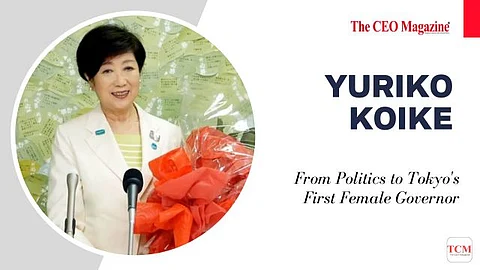
- News
- Women
- Magazine
- IndustryIndustry
- InsightsInsights
- Success Stories
- PublishPublish
- ContactContact
- Media KitMedia Kit

Yuriko Koike
From Politics to Tokyo's First Female Governor
Yuriko Koike, born on July 15, 1952, is a prominent Japanese politician who has made her mark in various leadership roles, most notably as the Governor of Tokyo. With a dynamic career that spans politics and public service, she has become one of Japan's most well-known figures. Her estimated net worth is approximately $5 Million.
Born and raised in Ashiya, Hyogo, a city near Kobe, Yuriko Koike was exposed to politics and international affairs from a young age. Her father, Yūjirō Koike, was a foreign trade merchant with a keen interest in Japanese-Arab relations to secure a stable petroleum supply. This early influence played a pivotal role in shaping Koike's future.
After a brief stint at Kwansei Gakuin University's School of Sociology, she ventured to the American University in Cairo to study Arabic. Her commitment and dedication earned her a Bachelor of Arts in Sociology as the top student from Cairo University in 1976.
Her journey into journalism and the world of politics was set in motion after working as an interpreter for Arabic and interviewing prominent figures like Muammar Gaddafi and Yasser Arafat in 1978.
Yuriko Koike's political career began when she was elected to the House of Councillors in 1992 as a member of the Japan New Party. Subsequently, she was elected to the House of Representatives in 1993, representing the Hyogo 2nd district. She continued her tenure, shifting party affiliations, and maintaining her seat, becoming a member of the Liberal Democratic Party (LDP) in 2002.
Her political influence grew further when she served as the Minister of the Environment and Minister of State for Okinawa and Northern Territories Affairs in Prime Minister Jun'ichirō Koizumi's cabinet. She was known as one of Koizumi's "assassins" during the 2005 Lower House election, running against an LDP hardliner candidate who opposed Koizumi's policies.
In June 2007, Koike made history by becoming Japan's first female Minister of Defense. However, her tenure in this role was brief, as she resigned due to the Aegis classified information leak scandal and internal political disputes.
In 2008, Yuriko Koike made headlines by launching her bid to become the president of the Liberal Democratic Party (LDP), becoming the first woman ever to seek the premiership in Japan's history.
Her campaign focused on breaking through societal deadlock, offering a female candidate, and advocating for clear policies and public empathy. Although she didn't secure the presidency, her historic run signalled her as a political force to be reckoned with.
Yuriko Koike's most notable achievement came in 2016 when she was elected as the Governor of Tokyo, becoming the first woman to hold this prestigious position. Her tenure was marked by ambitious goals and policies, often summarised by her "seven zeros" platform, which aimed to address socio-economic issues in Tokyo.
During her time as governor, she focused on reducing the waiting list for daycare admissions, decreasing the number of euthanised dogs and cats, and various infrastructure improvements. However, some challenges, like tackling the overwork culture and reducing congestion during rush hour, remained on the agenda.
In the political arena, Koike made a significant move by founding the national party Kibō no Tō and the regional party Tomin First no Kai in 2017. Kibō no Tō aimed to contest the general election with Koike as its leader, but it later merged with the Democratic Party for the People in 2018. Koike stepped down as the leader of Tomin First in the same year but continued to endorse and campaign for the party's candidates.
Yuriko Koike's passion for environmental issues has been a consistent theme throughout her career. In 2005, she proposed introducing a carbon tax to help Japan meet the goals of the Kyoto Protocol.
Her "Mottainai Furoshiki" campaign encouraged the use of traditional Japanese wrapping cloths (furoshiki) instead of plastic bags, promoting sustainability and environmental consciousness. She is also known for her stance against the use of biofuels made from food crops.
Koike's career hasn't been without controversy. She faced criticism for her refusal to acknowledge the 1923 Kantō Massacre, mainly targeting ethnic Koreans, as well as her alleged associations with groups labelled as anti-Korean.
Politically, Koike is seen as a conservative nationalist, and she has been involved with several conservative political groups. Her foreign and security policies are often regarded as hawkish, with a focus on issues like revising the interpretation of Article 9 of the Japanese Constitution to enable collective self-defence. She has also been a vocal supporter of the United States and the War on Terror.
Koike's diverse interests extend to promoting Japanese pop culture and even cosplaying as iconic anime characters. She initiated "Jisa Biz," a program aimed at reducing traffic congestion during the morning rush hour in Tokyo by promoting remote work and staggered work times.
As one of Japan's most high-profile and influential politicians, Yuriko Koike's career continues to be marked by ambition, advocacy for women's rights, and active engagement in global and local politics. Her impact on Tokyo and Japan's political landscape remains significant, and her future endeavours are eagerly anticipated.
Follow us on Google News
